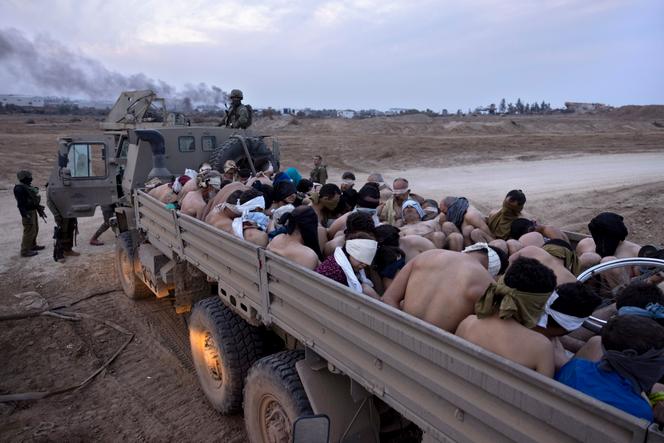


In the mid-morning on December 7, 2023, Israeli soldiers pointed their weapons under the windows of Ayman Lubbad's home in Beit Lahia, a city in the north of Gaza Strip, and ordered the local residents out of their homes, one by one. The men were forced to undress. The 31-year-old Palestinian, a lawyer and researcher for the Palestinian human rights NGO Palestinian Center for Human Rights (PCHR), found himself in his underwear amidst his neighbors, all in a row, kneeling on a sidewalk.
In recent weeks, mass arrests in Gaza have been revealed in dozens of videos, often filmed by the soldiers themselves. The scenario is almost always the same: The soldiers lay siege to a housing block, shouting the names of families in the area into megaphones. Children are kept out of the way. Sometimes the women are separated from them, and some are forced to remove their head coverings and are arrested.
The men, ranging in age from teenagers to sexagenarians, are systematically arrested and undressed. The Israeli army says it fears they are wearing explosive belts but assures that "they are allowed to get dressed as quickly as possible." Videos and testimonies gathered by Le Monde show, on the contrary, that prisoners are kept for hours half-naked. "Some of the videos are very humiliating for the people being held, a clear violation of international law," said Ajith Sunghay, head of the Office of the United Nations High Commissioner for Human Rights (OHCHR) in the occupied Palestinian territories.
The Israeli army denies carrying out random arrests. It says these men are "suspected of terrorist activities." Following Hamas's attacks on October 7, killing 1,200 people, Israel has carried out an unprecedentedly intense bombing campaign on Gaza and ordered the enclave's northern inhabitants to flee to the center and south in mid-October, before launching their ground invasion. More than 24,000 Palestinians have been killed, the majority of which were women and children. In the eyes of the Israeli army, people who remained in the north of the Gaza Strip are inevitably suspect. Lubbad, though, could not leave, at the time. "My wife had just given birth at the end of October," said the lawyer, contacted by telephone. He is now in Rafah in the south of the enclave, where he took refuge after his release.
Once assembled, the Palestinian detainees are identified using a facial recognition system and then taken, for the most part, outside their neighborhoods. "Some have reported that they heard gunshots and that people accompanying them have not reappeared. We assume that many were killed in extrajudicial executions. We have no videos or direct witnesses but corpses have been found, naked, their bodies riddled with bullets," said Raji Sourani, director of PCHR, speaking to Le Monde by telephone from Cairo.
You have 75% of this article left to read. The rest is for subscribers only.
